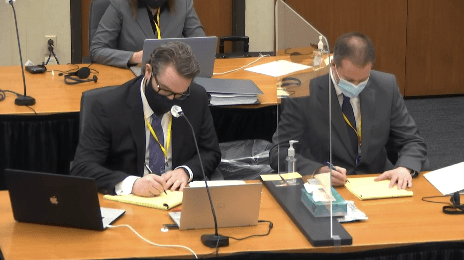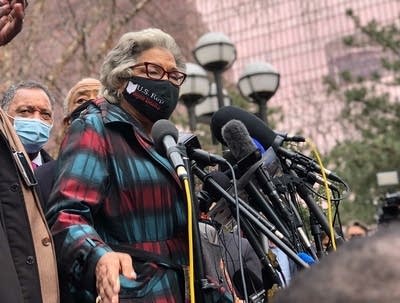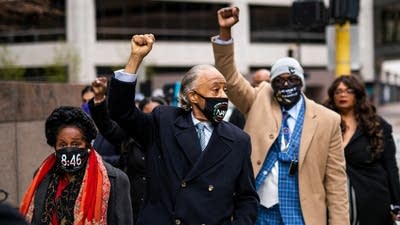Chauvin trial: Case goes to the jury; deliberations begin

Go Deeper.
Create an account or log in to save stories.
Like this?
Thanks for liking this story! We have added it to a list of your favorite stories.
3 things to know:
Jury deliberations begin as prosecution, defense end arguments; jury sequestered
Chauvin faces second-degree unintentional murder, third-degree murder and second-degree manslaughter; he did not testify in his defense, invoking his right to remain silent
Case expected to hinge on responsibility for George Floyd’s death; defense points to Floyd’s health conditions, drugs; prosecution points to Chauvin’s actions, knee on Floyd’s neck
Updated 8:27 p.m.
Derek Chauvin’s fate is now in the hands of 12 jurors who must decide if the ex-Minneapolis police officer acted reasonably in his use of force to restrain and subdue George Floyd last May during an arrest that ended in Floyd’s death — or if his actions killed Floyd.
Chauvin faces charges of second-degree unintentional murder, third-degree murder and second-degree manslaughter in Floyd’s killing while the man lay handcuffed and pinned to the pavement after allegedly using a counterfeit $20 to buy cigarettes at a corner store in south Minneapolis.
Bystander video at the scene captured Chauvin with his knee pressed against Floyd’s neck for more than nine minutes as the man pleaded that he couldn’t breathe and as people shouted from the curb that Floyd was dying. Chauvin and three other officers were fired.
The case went to the jury just before 4 p.m. Monday after the prosecution got a chance to push back against many of the points made earlier in the defense’s nearly three-hour presentation.
Turn Up Your Support
MPR News helps you turn down the noise and build shared understanding. Turn up your support for this public resource and keep trusted journalism accessible to all.
Prosecutor Jerry Blackwell turned aside defense arguments that Chauvin’s actions were affected by the rising tension with bystanders as he subdued Floyd, noting that there five “grown men police officers right there” including a Minneapolis parks officer who arrived near the scene, but that none called for backup.
Chauvin and the officers were in complete control of Floyd and the situation, said Blackwell. “He had the bullets, the guns, the Mace that he threatened bystanders with. He had the backup. He had the badge — all of it.”

Weeks of trial testimony have revolved around a basic question: Who or what is responsible for Floyd’s death? The defense has pointed to Floyd’s health conditions and the drugs in his system. The prosecution has put the blame on Chauvin’s actions and his knee on Floyd’s neck.
Hennepin County Medical Examiner Andrew Baker ruled Floyd’s death a homicide last year, saying Floyd went into cardiopulmonary arrest as then-officer Chauvin kept his knee pressed on the neck of the prone, handcuffed man.
Baker's report also identified “hypertensive heart disease,” “fentanyl intoxication” and “recent methamphetamine use” as other “significant conditions.”
On the stand in early April, Baker stood by his findings and described Floyd’s health problems and the drugs in his system as contributing — not direct — causes of his death. He said Chauvin’s actions “tipped (Floyd) over the edge” from life to death.
Citing the questions raised by the defense about whether Floyd’s health conditions, including an enlarged heart, killed Floyd, Blackwell said to jurors Monday before they began deliberating: “You were told, for example, that Mr. Floyd died because his heart was too big. The truth of the matter is that the reason George Floyd is dead is because Mr. Chauvin’s heart was too small.”
Defense says use of force ‘reasonable’
Before Blackwell spoke, defense attorney Eric Nelson worked to sow reasonable doubt in the jurors’ minds as he recounted Chauvin’s actions and Floyd’s health and the drugs in his system.
“The standard is not what should the officer have done in these circumstances. It’s not what could the officer have done differently under these circumstances. The standard is what were the facts that were known to this officer at the precise moment he used force … and what would a reasonable police officer have done,” attorney Eric Nelson told jurors.
Nelson argued that bystanders watching Floyd’s arrest and restraint were a concern for Chauvin.
Running a clip of the video of the arrest, Nelson pointed to the moment identified as when Floyd died, saying it was at that moment that Chauvin threatened to pepper spray the crowd as an off-duty firefighter left the curb and came nearer.
“All of these facts and circumstances simultaneously occur at a critical moment, and that changed officer Chauvin’s perception of what was happening,” Nelson said. He suggested that Chauvin did not start CPR on Floyd because the scene wasn’t safe.
Hoping to sow reasonable doubt, Nelson urged jurors not to focus on the nine-plus minutes that Chauvin’s knee was on Floyd’s neck but to think about the prior 17 minutes as officers struggled to get Floyd to comply with orders and get in the back of the squad car as Floyd resisted saying he was claustrophobic.
“Human behavior is unpredictable and nobody knows it better than a police officer,” Nelson said during what became a nearly three hour argument that needed to be paused so the jury could eat.
Trying to blunt the prosecution argument that Chauvin was indifferent to Floyd’s pleading that he was in pain and couldn’t breathe, Nelson noted that the officers had called for paramedics and upgraded the call.
He also cited other trial witnesses agreeing that suspects sometimes feign a medical emergency “simply because they don’t want to go to jail.”
Nelson also worked to play down Floyd’s prone position on the pavement.
“People sleep in the prone position. People sun tan in the prone position. People get massages in the prone position,” he said at one point. “The prone position during restraint is not an inherently dangerous act.”
‘Betrayed the badge’
Closing arguments began Monday with prosecutors painting the ex-officer as a cop who disregarded his training, his department’s use of force rules and Floyd’s suffering as the man lay handcuffed and pinned to the street under Chauvin’s knee.
“George Floyd was not a threat to anyone,” prosecutor Steve Schleicher told jurors. “Facing George Floyd that day did not require one ounce of courage. All that was required was a little compassion, and none was shown.”
The medical examiner ruled the death a homicide, Schleicher said. “What the defendant did to George Floyd killed him.”
Interspersing his remarks with video from the arrest and restraint, Schleicher said Chauvin’s subduing of Floyd was not within the bounds of his training and not reasonable police behavior.
“What the defendant did was not policing. What the defendant did was an assault,” the prosecutor said. “He betrayed the badge.”
Aware that jurors generally tend to defer to police officers on use of force, Schleicher worked to define Chauvin as a bad cop. "It’s not an anti-police prosecution,” he said at one point. “It’s a pro-police prosecution.”
Walking the jury through the requirements of second-degree murder — the most serious charge against Chauvin — Schleicher noted the statute’s language of "intentionally inflicting or attempting to inflict bodily harm upon the victim.”
He added: “If you’re doing something that hurts somebody, and you know it, then you’re doing it on purpose.” The state, he said, did not need to prove Chauvin intended to kill Floyd.

He noted that Chauvin was bound by his training to provide CPR and other medical aid with Floyd pleading that he couldn’t breathe just before losing consciousness. “Was George Floyd resisting when he was trying to breathe? No.”
The prosecutor said Chauvin heard Floyd’s pleadings for air, “acknowledged it, and all he did was mock him. ‘Uh huh. It takes a lot oxygen to stay that.’”
The climactic chapters of the trial began Monday morning at the Hennepin County Courthouse. Judge Peter Cahill began by walking jurors through the law and each count. The case will then go to jurors to deliberate perhaps the most consequential verdict in Minnesota history.
Bracing for a verdict
It’s not clear how fast the jury in the Chauvin trial will rule. Jurors will remain isolated at a local hotel during their deliberations. Mitchell Hamline School of Law adjunct professor Angela Porter said the desire of sequestered jurors to return home to their lives and families can sometimes be a motivating factor in their speed.
As the jurors deliberate, tensions will stay high in the Twin Cities and across the country. Floyd’s killing sparked worldwide outrage when the video of the police subduing him went viral on social media. It drove peaceful mass demonstrations that sometimes spasmed into violence.
The image of a white police officer who appeared casually indifferent to the suffering of a Black man under his knee begging for his life made race an inescapable piece of the trial and jury selection.
The jury is made up of three Black men, including two who are immigrants; one Black woman; two women who identify as multiracial; two white men; and four white women.
If the 12-member jury can't reach a verdict, the judge can declare a hung jury and the state could try to convict Chauvin all over again.
Only one police officer in Minnesota history has been convicted for killing someone on duty. Mohamed Noor was found guilty in 2019 of murder and manslaughter in the killing of 911 caller Justine Ruszczyk in Minneapolis. He was sentenced to 12 1/2 years.
Two other law enforcement officers were found not guilty in on-duty killings.
Local and national civil rights leaders prayed and spoke to reporters Monday during a break in the closing arguments, including Ohio Democratic Rep. Joyce Beatty, who chairs the Congressional Black Caucus.
“It is not about Minnesota versus all police,” she said. “It is about Minnesota versus Derek Chauvin."
Correction (April 19, 2021): Due to an editor’s error, an earlier version of the story incorrectly described Chauvin as being the second officer convicted for killing someone on duty. The jury is deliberating charges. He has not been convicted of any crime.
Trial basics

Who’s who: A look at the key players in the trial.
Key questions about jury deliberations, answered: The panel will weigh whether the former Minneapolis officer’s actions led to George Floyd’s death while in police custody last May.
What we know about the jurors: The 12 jurors reviewing the case include a chemist, a youth volunteer, a cardiac nurse and an IT professional.
Chauvin's lawyer is outnumbered, but has help: A handful of attorneys appeared for the prosecution, compared to a single attorney to defend Derek Chauvin.
Legion of Chauvin prosecutors, each with own role: Viewers may have been struck by the array of prosecutors who took turns presenting their case. The choice of who does what was no accident.
MPR News on its coverage: Nancy Lebens, the newsroom’s deputy managing editor, answered audience questions about our reporting plans.
George Floyd and his legacy

Remembering George Floyd, the man: Before he became a symbol in the fight for racial justice, friends say George Floyd was a “gentle giant” who sought a fresh start.
Making George Floyd Square: Here’s how the site of George Floyd’s killing — 38th Street and Chicago Avenue in Minneapolis — is being reshaped.
Rescuing the plywood — and memorializing a movement: Two Black women are leading the effort to preserve the murals painted on storefront boards in the Twin Cities.
Calls for change: Here’s what some activists tell MPR News about their experiences with race in Minnesota, why they march and what they hope for the future.
Read more

Lawmakers tussle over public safety practices as verdict nears: Pressure will be on state leaders as they decide how to respond to both the short-term ramifications and the broader calls for change.
Feds weighing how to respond after verdict: The Biden administration is privately weighing how to handle the upcoming verdict, including considering whether President Joe Biden should address the nation and dispatching specially trained community facilitators from the Justice Department, aides and officials said. (The Associated Press)
Critics say Chauvin defense 'weaponized' stigma for Black Americans with addiction: Derek Chauvin's defense has suggested George Floyd's drug use might have made him more "volatile" and unpredictable, justifying the use of force. Critics say Floyd needed health care and compassion. (NPR)
What the Chauvin trial feels like for the neighbors keeping vigil in George Floyd Square: People in the community talk about Black liberation, “vulturistic” visitors and why there’s not a TV showing the trial. (Sahan Journal)
NPR’s live blog: The latest from the murder trial of Derek Chauvin.





